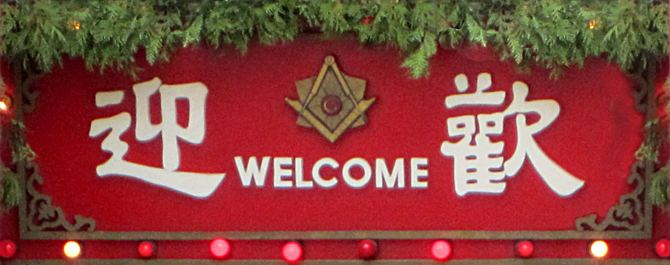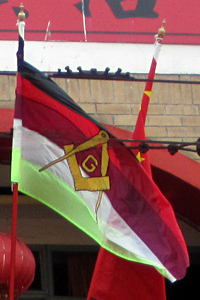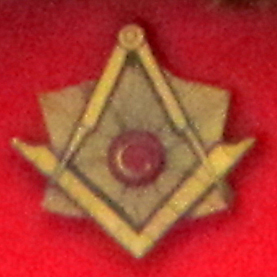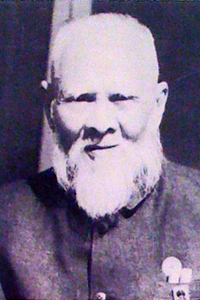
|

|
The available history of the Hongmen society, styling themselves since 1920 as the Chinese Freemasons, offers no justification for their adoption of the name "Freemasons" or their use of the masonic square and compasses.
 A flag and welcome sign displayed at 116 East Pender Street, Vancouver during the anniversary celebrations of the Hong Men and Dart Coon societies in August 2010.
A flag and welcome sign displayed at 116 East Pender Street, Vancouver during the anniversary celebrations of the Hong Men and Dart Coon societies in August 2010.
| |
"The Hongmen Chee Kung Tong (Chinese Freemasons) of Canada had made significant contributions, both in term of human and financial resources, in its patriotic and enthusiastic support of Dr. Sun Yat-sen's revolutionary efforts to overthrow the Qing Dynasty.
"Canada's first Hung Shun Tong, a kind of mutual-assistance society set up to provide much needed social support and services to a growing number of single male gold miners and railway workers arriving from China, was established in Barkerville, British Columbia in 1863, five years after the landing of the first group of Chinese gold miners, mostly from California, who originally came from the southern Chinese province of Guangdong. By the mid-1860s, the Chinese population in major northern BC mining towns was around 5,000.It is reported that about 90% of those from San Francisco were members of the Hung Shun Tong, first founded in 1849 to serve the needs of the fast growiong Chines community in the U.S. west coast.
 Situ Meitang (1868-1955), founder of the Chinese Chee Kung Tang.
Situ Meitang (1868-1955), founder of the Chinese Chee Kung Tang.
| |
"In 1876, on the advice of senior Tong leaders from the U.S., Canada's Hung Shun Tong changed its name to Hongmen Chee Kung Tong. In 1920, the Hongmen Chee Kung Tong in Vancouver, BC, changed its English name to Chinese Freemasons. Between 1877 and 1912, a total of 54 local lodges were set up in seven provinces across Canada, from coast to coast, with 33 in B.C., six in Alberta, one in Alberta, one in Manitoba (Winnipeg), two in Saskatchewan (Moose Jaw) and Regina), nine in Ontario, two in Quebec (Montreal and Quebec City) and one in Nova Scotia (Halifax).
"The founding of the Chinese Chee Kung Tang (Party) was officially announced at the historic October 1925 general meeting in San Francisco, organised by the Headquarters of the Chinese Chee Kung Tong (Society) of America. That important meeting was attended by Hongmen Chee Kung Tong representatives from five continents. The second general meeting of the Hongmen Chee Kung Party was held in the British Crown Colony of Hong Kong in 1931."
Text from a display poster, Dr. Sun Yat-Sen Classical Chinese Garden, 2011.
|